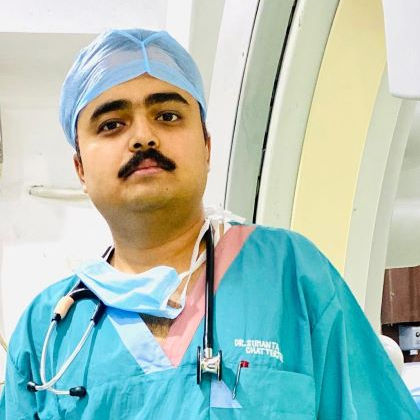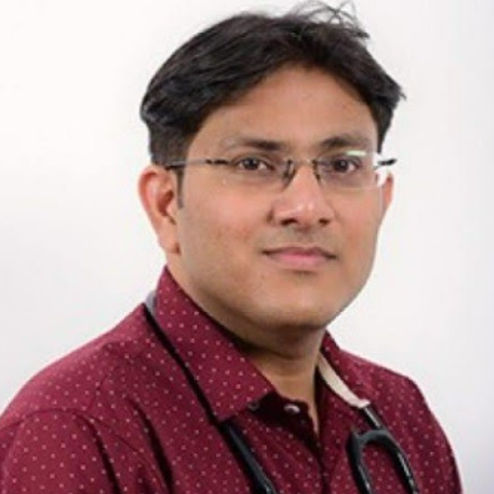Heart Disease in Children
Explore the causes, symptoms, management, and treatment options for heart disease in children. Learn about early diagnosis, effective interventions, and long-term care strategies for improving pediatric heart health.

Written by Dr Sonia Bhatt
Last updated on 3rd Jul, 2025
Heart disease in children is an important health problem encompassing CHD and, to some extent, acquired heart disease. All these conditions affect normal childhood development and growth, hence, a need to ensure early identification and intervention remains crucial.
In many cases, medical science has progressed significantly, and children with potentially deadly diseases have a much better chance of living normal, healthy lives.
Types of Heart Disease in Children
There are two main classifications for kids with heart disease—congenital and acquired heart diseases.
Congenital heart diseases (defects that are present since birth) are the most common kind of heart disease. These can include small septal defects that may be self-limited to massive defects needing surgical intervention. Some congenital heart defects affect the flow of oxygenated blood, leading to cyanotic defects. These defects reduce oxygen levels in the bloodstream, causing symptoms like cyanosis (a bluish tint to the skin), which is commonly seen in conditions such as the Tetralogy of Fallot.
Other forms of acquired heart diseases, though rare at the present time, are rheumatic heart disease and Kawasaki disease. These usually stem from infections or autoimmune reactions and are a serious menace to the heart system if left untreated.
Causes of Heart Disease in Children
Congenital heart diseases or heart diseases developed during childhood may also result from hereditary factors and the overall environment in the womb. Knowing these factors is useful in the prevention and management of the resultant conditions.
Genetic Factors:
Chromosomal abnormalities such as Down syndrome significantly increase the risk of congenital heart defects (CHDs).
Mutations in specific genes related to heart development may lead to structural anomalies.
A family history of heart disease also heightens the likelihood of children inheriting similar conditions.
Environmental Influences:
Maternal infections during pregnancy, like rubella, can disrupt normal heart development in the fetus.
Poorly controlled diabetes in the mother is another major risk factor, often leading to more complex heart defects.
Exposure to harmful substances, such as alcohol, tobacco, and certain medications, during pregnancy can adversely affect fetal heart formation.
Nutritional deficiencies, particularly of folic acid, may also contribute to congenital abnormalities.
Symptoms and Warning Signs
Recognising the symptoms of heart disease in children is critical for early intervention and effective treatment. Symptoms can vary based on age and the severity of the condition, but some common signs are consistent across age groups.
Rapid or laboured breathing, often noticeable during feeding or sleep.
Difficulty feeding, with the baby becoming fatigued or irritable during meals.
Poor weight gain or failure to thrive, even with adequate feeding.
Cyanosis, presenting as a bluish tint to the lips, fingertips, or toes, especially during crying or feeding.
Shortness of breath during physical activities or exertion in older children.
Fatigue or frequent complaints of feeling tired, even after minimal activity.
Chest pain, which may occur during exercise or spontaneously.
Swelling in the hands, ankles, or feet, often indicative of fluid retention.
Palpitations or irregular heartbeats reported by older children who can articulate their symptoms.
Consult Top Doctors For Heart Disease in Children
Diagnosis of Heart Disease
Diagnosing heart disease in children involves a combination of clinical evaluation and advanced diagnostic tools tailored to the specific symptoms and suspected condition. Paediatric cardiologists play a crucial role in ensuring accurate and timely identification of these conditions.
Key diagnostic tools include:
Echocardiography: A non-invasive ultrasound method that generates detailed images of the heart’s structure and function, often used as the first-line diagnostic test.
Electrocardiograms (ECG): Records the electrical activity of the heart to detect rhythm abnormalities such as arrhythmias or conduction issues.
Chest X-rays: Provide an overview of heart size and lung condition, offering clues about potential cardiac or respiratory complications.
MRI and CT Scans: Advanced imaging techniques that deliver high-resolution visuals, particularly useful for evaluating complex structural defects and planning surgeries.
Cardiac Catheterization: A minimally invasive but highly informative procedure used to measure blood pressure and oxygen levels within the heart chambers, as well as perform certain therapeutic interventions.
The process of diagnosis takes the following route:
Pediatric cardiologists begin with a thorough medical history review and physical examination, often detecting murmurs or irregular heart sounds.
Based on initial findings, appropriate diagnostic tests are chosen to confirm the presence and nature of the heart condition.
In some cases, fetal echocardiography can diagnose congenital heart defects during pregnancy, enabling early planning for treatment.
Early and accurate diagnosis allows for timely intervention, improving the prognosis and quality of life for affected children.
Treatment Options
Treatment for heart disease in children is tailored to the specific condition and its severity, ensuring the best possible outcomes. Advances in medical technology have significantly improved both the effectiveness and safety of these treatments.
Key classes of treatment approaches include:
Medical Management:
Diuretics are used to manage fluid retention and reduce the heart’s workload.
Beta-blockers help regulate heart rate and improve overall cardiac function.
Anticoagulants prevent blood clots, reducing the risk of complications.
Catheter-Based Procedures:
These minimally invasive techniques include balloon angioplasty to open narrowed blood vessels and device closures for repairing septal defects.
They often result in shorter recovery times and lower risks compared to open surgery.
Surgical Interventions:
Open-heart surgery is essential for correcting complex congenital defects such as valve replacements or arterial switches.
These surgeries are now performed with greater precision due to advancements in imaging and surgical techniques.
Each child’s treatment plan is developed collaboratively by pediatric cardiologists and surgeons, ensuring a comprehensive approach to care.
Lifestyle and Dietary Considerations
Maintaining a healthy lifestyle and proper dietary habits is critical for children with heart conditions to support recovery and ensure overall well-being.
Include a variety of fruits, vegetables, whole grains, and lean proteins.
For children requiring increased energy, calorically dense foods like healthy fats can be beneficial.
A low-sodium diet may be necessary to manage blood pressure and reduce fluid retention.
Ensure adequate water intake to support circulation and prevent dehydration, especially for active children.
Engage in moderate physical activities suitable for the child's condition, but avoid overly strenuous activities.
Avoid sugary snacks and processed foods, which can contribute to weight gain and metabolic strain.
Living with Heart Disease
Learning how to cope with this condition is a lifelong endeavour, which requires children to have regular appointments with doctors, support their emotional state, and make certain changes to their lives. In most cases, follow-up with paediatric cardiologists is crucial to tracking the patient’s development and fine-tuning the therapy as they age. Such visits assist in early screening for complications to ensure efficient management measures are put in place.
There are various avenues for receiving support—both emotional and practical. Counselling can help parents and families to reduce stress and anxiety they grow with the disease, and support groups can be used to help families feel less alone. These resources are quite useful in addressing the difficulties of caregiving and in creating a conducive environment for a child.
Regular medical check-ups are critical to monitor heart health and adjust treatment plans as needed.
Emotional support through counselling helps families manage stress and maintain well-being.
Support groups connect families with others facing similar challenges, providing practical advice and emotional camaraderie.
Education about the condition empowers families to make informed decisions and advocate effectively for the child’s needs.
Prognosis and Complications
The prognosis for children with heart disease has been broadened over the course of time. Several children today can effectively live a normal, healthy life where all their activities are managed. However, some may have a life-long disability, learning and developmental delay or require further surgeries. Avoiding such risks entails compliance with treatment regimens, following a healthy heart profile, and scheduling doctor visits.
Conclusion
Heart disease in children, though complex, is increasingly manageable with early detection, advanced treatments, and comprehensive care. Ongoing research and technological advancements offer hope for even better outcomes in the future.
Consult Top Cardiologist
Consult Top Doctors For Heart Disease in Children

Dr. Amit. A. Bharadiya
Cardiologist
12 Years • MBBS, MD General Medicine, DNB Cardiology, FSCAI
Maharashtra
Surabhi Hospital, Maharashtra, Maharashtra

Dr. S B Bhattacharyya
Cardiologist
22 Years • MBBS, MD(General Medicine),DM (Cardiology)
Kolkata
Gariaheart Clinic, Kolkata
Dr. Jayarajah Mariappan
Cardiologist
45 Years • MBBS, MD(GEN MEDICINE), DM(CARDIOLOGY)
Chennai
Sooriya Hospital, Chennai

Dr. Sumanta Chatterjee
Cardiologist
12 Years • MBBS,MD General Medicine,DM Cardiology
Kolkata
HealthYou Speciality Clinic & Diagnostics., Kolkata
(25+ Patients)

Dr. M Sudhakar Rao
Cardiologist
8 Years • MBBS, MD General Medicine, DM Cardiology
Bengaluru
UMC, Kormangla, Bengaluru
Consult Top Cardiologist

Dr. Amit. A. Bharadiya
Cardiologist
12 Years • MBBS, MD General Medicine, DNB Cardiology, FSCAI
Maharashtra
Surabhi Hospital, Maharashtra, Maharashtra

Dr. S B Bhattacharyya
Cardiologist
22 Years • MBBS, MD(General Medicine),DM (Cardiology)
Kolkata
Gariaheart Clinic, Kolkata
Dr. Jayarajah Mariappan
Cardiologist
45 Years • MBBS, MD(GEN MEDICINE), DM(CARDIOLOGY)
Chennai
Sooriya Hospital, Chennai

Dr. Sumanta Chatterjee
Cardiologist
12 Years • MBBS,MD General Medicine,DM Cardiology
Kolkata
HealthYou Speciality Clinic & Diagnostics., Kolkata
(25+ Patients)

Dr. M Sudhakar Rao
Cardiologist
8 Years • MBBS, MD General Medicine, DM Cardiology
Bengaluru
UMC, Kormangla, Bengaluru

